Student information card of Ernest (Knocks Off), a member of the Sioux Nation, who entered the school on October 6, 1879 and died on December 14, 1880 while attending the school. He was buried in the cemetery on the school grounds.


Student information card of Ernest (Knocks Off), a member of the Sioux Nation, who entered the school on October 6, 1879 and died on December 14, 1880 while attending the school. He was buried in the cemetery on the school grounds.
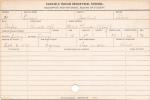
Student information card of Ernest, a member of the Sioux Nation, who entered the school on October 6, 1879 and died on December 14, 1880. Ernest was buried in the cemetery on the school grounds.
In school documentation Ernest's name is also spelled Earnest. He is also known as Knocks Off and We-cha-ka-gpah.
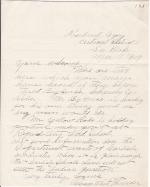
Student file of Clarence White Thunder (Big Feather), a member of the Sioux Nation, who entered the school on November 14, 1883 and ultimately departed on April 27, 1897. The student did not attend the school continuously, but left and reentered. The file contains student information cards, returned student surveys, a former student response…
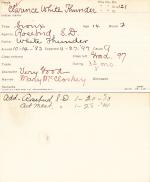
Student information card of Clarence White Thunder, a member of the Sioux Nation, who entered the school on November 14, 1883 and departed on April 27, 1897. The file indicates that Thunder graduated in 1897, married Mary McCloskey, and was living in Cut Meat, South Dakota in 1914.
Note: Although this card shows an arrival date of…

Student information card of Rose (here Rosy) White Thunder (Red Girl), a member of the Sioux Nation, who entered the school on November 14, 1883 and departed on June 14, 1887.
In school documentation Rose White Thunder's name is also spelled Rosy White Thunder, Rosie White Thunder, and Rosa White Thunder. She is also known as Red Girl.…
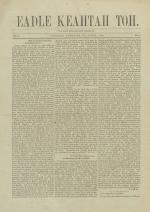
Page one opened with a teacher identified as A.J.S. (Alfred J. Standing) reminiscing about his time teaching Native Americans before he came to Carlisle. Also on the page was an article signed by "G. Le R. B." (George Le Roy Brown) on the civilization of the Indians, comparing it to the conquests of the Roman Empire and its assimilation of less…

Portrait of five Sioux chiefs posed with two interpreters on the steps of the bandstand on the school grounds. The chiefs are Black Crow, Two Strike, White Thunder, Spotted Tail, and Iron Wing. The interpreters are Louis Roubideaux and Charles Tackett.
Note: The Cumberland County Historical Society has two copies of this image: PA-…
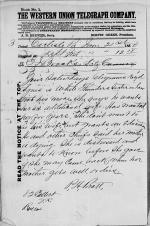
Richard Henry Pratt informs the Acting Commissioner of Indian Affairs that White Thunder would like his sister-in-law as his second wife, but she is not interested. She is currently a student at the Carlisle Indian School, but there are reports of her mother dying. Before she leaves the school to be with her mother, she'd like to know if she…
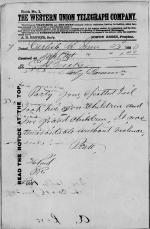
Richard Henry Pratt informs Acting Commissioner of Indian Affairs E. J. Brooks that the party has left, and Spotted Tail took his children and grandchildren home.
Note: This item was copied from U.S. National Archives microfilm reels (M234), which were filmed from the original documents found in Record Group 75, Entry 79, "Letters…
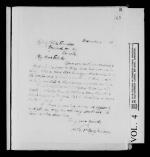
Seven letters, written between December 6 and December 13, 1880, from Richard Henry Pratt to Chief White Thunder about the illness of his son, Ernest.
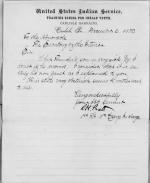
Richard Henry Pratt informs the Commissioner of Indian Affairs that Chief White Thunder's son, Ernest, is very sick and may die. Pratt believes that it's "entirely his fault" and that he "wants to die."
Note: This item was copied from U.S. National Archives microfilm reels (M234), which were filmed from the original documents found in…
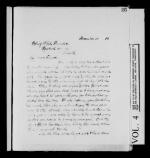
Richard Henry Pratt writes to Chief White Thunder telling him of the death of his son, Ernest.
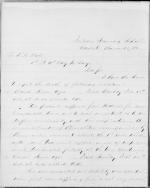
Physician Charles H. Hepburn provides a report on the deaths of two Rosebud Sioux students: Maud and Ernest. Maud died of multiple lung issues on December 13, 1880 with Ernest dying of diphtheria on December 14, 1880. Richard Henry Pratt forwards Hepburn's report to the Commissioner of Indian Affairs.
Note: This item was copied from U.S…
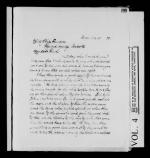
Richard Henry Pratt writes to Chief White Thunder about the funeral ceremony and burial of his son, Ernest. Pratt expresses his sorrow and sympathy at White Thunder's loss, but also argues that White Thunder was right to send Ernest to the school.
Pratt notes that Maud (Little Girl) died the same night as Ernest, so they were…
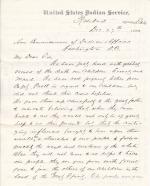
The parents of Ernest White Thunder and Maud Swift Bear request that their bodies be returned to them in order to have them buried near their homes. They note that while Richard Henry Pratt sent them frequent letters they were not aware that their children were near death and are now unable to fulfill their hope of returning home to help their…
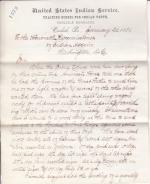
Richard Henry Pratt notes that when he spoke to American Horse and other Sioux Chiefs in 1880 as they returned home they were promised a light wagon produced at Carlisle. According to Pratt sending the wagons along with some tinware would be a good method to show the work being done by the students of the Rosebud and Pine Ridge Agency as well…
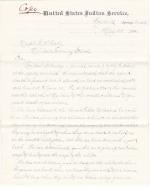
Richard Henry Pratt forwards to the Commissioner of Indian Affairs two letters he received from the Rosebud Agency. One concerns the deaths of Rosebud students while at Carlisle and the desire of the Rosebud Sioux Chiefs to educate their children closer to home. The second from Black Crow protesting the actions of Spotted Tail and others who…
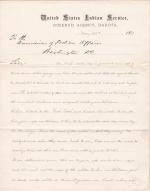
A Council of Sioux Chiefs including Spotted Tail, Two Strike, White Thunder, and Swift Bear from the Rosebud Agency writes to the Commissioner of Indian Affairs to protest the deaths of their children at Carlisle and asks for a local school in order to educate their children along with teachers. U.S. Indian Agent John Cook notes that he is…
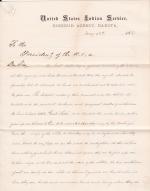
A Council of Sioux Chiefs including Spotted Tail, Two Strike, White Thunder, and Swift Bear from the Rosebud Agency writes to President James A. Garfield to protest the deaths of their children at Carlisle and asks for a local school in order to educate their children along with teachers. U.S. Indian Agent John Cook notes that he is agreement…
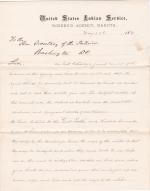
A council of Sioux Chiefs including Spotted Tail, Two Strike, White Thunder, and Swift Bear from the Rosebud Agency writes to the Secretary of the Interior to protest the deaths of their children at Carlisle and asks for a local school in order to educate their children along with teachers. U.S. Indian agent John Cook notes that he is agreement…
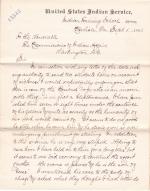
Richard Henry Pratt seeks authority to send James, a member of the Sioux Nation, back to his home.
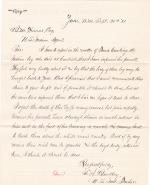
Richard Henry Pratt forwards a letter that was originally sent to Benjamin M. Thomas, U.S. Indian Agent at the Pueblo Agency, from S. A. Bentley a teacher in the Indian Service. Bentley's letter concerns the wishes of Frank Cushing's parents to have his body repatriated to Zuni. Pratt comments that this is not a simple matter and references the…
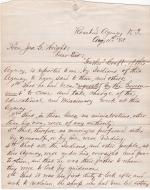
Richard Henry Pratt documents his trip to the Rosebud Agency where he attempted to secure ninety students for the school. He notes that after an initial meeting where this was received with much enthusiasm, he failed to gather the allotted students due to the work of the Catholic priest at the agency. Pratt claims that the priest may be opposed…
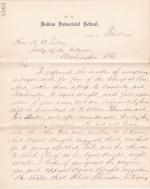
Richard Henry Pratt writes to the Secretary of the Interior regarding a proposal to supply four wagons to Sioux Chiefs rather than having them travel East.